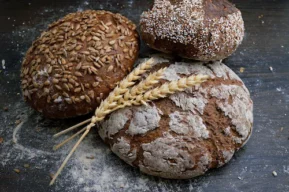Gluten is a type of protein found in wheat, barley, and rye. It’s what gives dough its elastic texture and helps it rise when baked. Gluten is commonly used in baked goods such as bread, pasta, and pastries.
Is Gluten Vegan?
So, is gluten vegan? The answer is yes, gluten itself is vegan. As mentioned earlier, gluten is simply a protein found in certain grains. It’s not derived from any animal products, nor is it tested on animals. Therefore, it’s completely vegan-friendly.
The Confusion Between Gluten and Animal-Derived Ingredients
However, where the confusion arises is when gluten-containing products are used in conjunction with animal-derived ingredients. For example, many breads and pastries contain butter, milk, or eggs. While the gluten itself is vegan, the final product may not be if it contains animal-derived ingredients. It’s important for vegans to always check the ingredient list before consuming any product that contains gluten.
Gluten-Free Products and Veganism
Many people who adopt a vegan lifestyle also choose to avoid gluten for various reasons, such as gluten intolerance or celiac disease. Luckily, there are many gluten-free products available on the market that are also vegan. These include things like rice, quinoa, and gluten-free flours. It’s important to note, however, that just because a product is gluten-free doesn’t necessarily mean it’s vegan, so always check the ingredient list.
The Health Benefits of Gluten-Free and Vegan Diets
Many people choose to adopt a gluten-free and vegan diet for health reasons. A plant-based diet can reduce the risk of heart disease, high blood pressure, and certain types of cancer. Additionally, a gluten-free diet can help alleviate symptoms for those with celiac disease or gluten intolerance. Combining the two can lead to a well-rounded and healthy diet.
The Importance of Reading Labels
As mentioned earlier, it’s important for vegans to read labels to ensure that a product is free from animal-derived ingredients. This is also true for those who follow a gluten-free diet. Many products contain hidden sources of gluten or animal products, such as modified food starch or whey. Always read the ingredient list thoroughly before purchasing a product.
Vegan and Gluten-Free Recipes
Adopting a vegan and gluten-free diet doesn’t have to mean sacrificing taste. There are many delicious recipes available online that are both vegan and gluten-free, such as roasted vegetable quinoa bowls or gluten-free vegan pizza. Get creative in the kitchen and try out new recipes to find what works best for you.
The Environmental Impact of a Vegan and Gluten-Free Diet
In addition to health benefits, a vegan and gluten-free diet can also have a positive impact on the environment. Animal agriculture is a leading contributor to greenhouse gas emissions and deforestation, while the production of gluten-containing grains requires large amounts of water and land. By choosing a plant-based and gluten-free diet, you can help reduce your carbon footprint.
Overcoming Challenges with a Vegan and Gluten-Free Lifestyle
Adopting a vegan and gluten-free lifestyle can come with its challenges. It can be difficult to find suitable options when dining out or attending social events. Additionally, gluten-free and vegan products can often be more expensive than their non-vegan and gluten-containing counterparts. However, with proper planning and preparation, it is possible to overcome these challenges and maintain a healthy and satisfying lifestyle.
Finding Support and Resources
If you’re considering adopting a vegan and gluten-free lifestyle, there are many resources available to help. Online communities and support groups can provide guidance and advice, while cookbooks and blogs offer recipe inspiration. Additionally, consulting with a registered dietitian can help ensure that you’re getting all the necessary nutrients in your diet.
Challenges of a vegan gluten-free diet
While there are many potential benefits, there are also some challenges to following a vegan gluten-free diet. It can be difficult to find suitable products, especially when dining out or traveling. It may also be more expensive, as gluten-free and vegan products can be pricier than their conventional counterparts.
Additionally, some people may find it difficult to get enough protein and other essential nutrients on a vegan gluten-free diet. It’s important to plan meals carefully and consider taking supplements if necessary.
For people with celiac disease or non-celiac gluten sensitivity, going vegan may be a challenge. Many vegan products contain wheat, barley, or other gluten-containing ingredients. However, there are many gluten-free vegan alternatives available, such as tofu, tempeh, beans, lentils, nuts, seeds, and gluten-free grains like quinoa, rice, and corn. Additionally, some vegan products are specifically labeled as gluten-free, making it easier to identify safe options.
Overall, whether or not a vegan diet is gluten-free depends on the individual’s choices and dietary needs. With careful planning and attention to ingredient labels, it is possible to follow both diets and enjoy a wide variety of nutritious and delicious foods.
Conclusion
In conclusion, gluten itself is vegan. It’s simply a protein found in certain grains and is not derived from any animal products. However, confusion can arise when gluten-containing products are combined with animal-derived ingredients. As always, it’s important to check the ingredient list to ensure that a product is both gluten-free and vegan.

